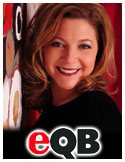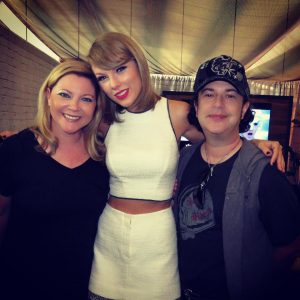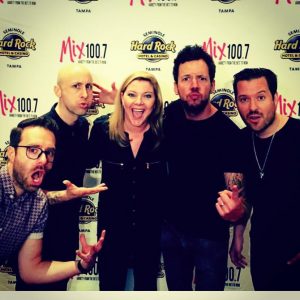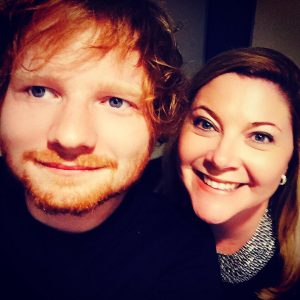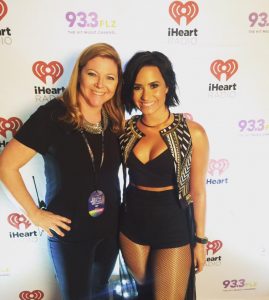
by Fred Deane

Randi West
Randi West has a philosophy in life and at the very core of that philosophy is being a good human being, and everything else seems to fall right in place from that center point on.
She’s followed this to a T and it has allowed her to pursue and realize a successful career. Driven, passionate, dedicated and accountable, Randi has exemplified a true and trusted employee with high values and standards in accomplishing goals.
She began her career with Saga Communications (“upstanding company and good people”) in Springfield, IL, and after prominent stints at WVKS/Toledo and WFKS/Cincinnati, in 2004 she arrived in Raleigh to take the programming helm of G105. It was there that Randi reached the high point of her career, which was finishing #1 in all demos in one book in 2010.
In June of 2011, Randi joined the iHeartMedia Tampa team as PD of WMTX where she recently celebrated her sixth anniversary with the station.
You’ve been in Tampa at MIX for six years now. What aspects of the HAC world have changed your perspective of radio after spending several prior years in Top 40? Honestly the formats over the past few years have really migrated to a similar product. Also, when I programmed G105 in Raleigh, it was more an adult Top 40 so the transition to HOT AC wasn’t drastic at all.
What are some of the “common ground” rules of programming HAC and T40, and what are some distinct differences? Well, because the formats have really overlapped each other over the past few years it is an excellent question. In truth, regardless of format it’s really more about what fits your “brand.” There are plenty of Top 40 stations that don’t really play the Rhythmic tracks, and Hot AC’s in competitive markets that lean more Pop than Hot AC. Programming either format comes down to doing what is right for your situation, your brand, your market and listeners. Certainly the big hits are the easy ones to pick…it’s the secondaries that really make up the differences.
WMTX is a rather tightly programmed HAC, musically speaking. Is this a general philosophy for the HAC format, or is it more about the MIX brand for Tampa? Ha! Yes, anyone will tell you I’m a tough add. I’m a HUGE music fan and love lots of music. However, our approach has been to play the biggest songs we can while offering our audience a variety of different genres and eras of music. There is a tipping point when you have too much of one and not enough of another. Balance is key. Also, I think adult audiences aren’t moving as quickly as we think they are. They have lives, kids, and jobs. Being more conservative can never hurt you.
What are the major factors that contribute to a song’s worthy evaluation of airplay on MIX? That’s top-secret info! Ha! Look there are many factors. We look at everything. Sales, digital data, Shazam, research, and charts. They all factor into the overall picture of a song. We use all the tools and resources we have and as I mentioned earlier, I don’t need help picking hits. It’s choosing the secondaries that bring the flavor of a brand.
iHeartMedia has set new standards for national event programming and entertainment. How do you take advantage of these opportunities at the local level? iHeart leads the way in HUGE events that no one else can do. It’s so important to our brands to have these events, and money can’t buy experiences. It’s one thing to be able to play a new song from say Miley Cyrus, but it’s another thing to bring Miley Cyrus front and center to our winners in a unique environment they would never experience again.
I always use this example. ANYONE can buy a concert ticket, but what we bring to our listeners are one-of-a-kind experiences. To be able to see artists across multiple genres of music such as Lady Gaga, Brad Paisley, Linkin Park all on one stage at our iHeartRadio Music Festival in Vegas is beyond a concert, and once-in-a-lifetime moments happen. It’s one of the things I’m very proud of, everything we do is OVER THE TOP. Listeners know it and remember it.
We do embrace our iHeart events on a local level, but also create our own in our Gold and Diamond Source Performance Theater. We also create our own local brands like Free Trip Friday, name any other station in the country where EVERY Friday they give listeners a free trip somewhere. Mix is a lifestyle driven brand and our listeners crave more time. Time with their families away from the day to day rat race.
What are the pros of being an on-air talent and PD relative to listener engagement, and how does it inform your programming tendencies?
In an earlier question, you asked what metrics we use to gauge airplay or songs for consideration. Being an on-air PD has given me so many advantages. I get the emails from fans about songs, the tweets, the facebook messages. I interact with our audience every day. I’m in the studio talking to them and I ask questions! I feel like that is the biggest secret weapon. I AM THEM. I live their lifestyle to many degrees. Being with my fans everyday helps that. To some degree I do not engage social media as much as just talking to them when I’m in the studio. Programmers can easily get caught up in internet trolls who hide behind keyboards who may hate everything or love everything.
What areas of programming fascinate you the most?
I’ve always loved Promotions. It’s part of my history in this business and I know it’s the most thankless job in the industry. But creating ideas and seeing them executed has always been a passion of mine. I’m very proud of our Free Trip Friday brand on Mix. We have really crafted that brand as an extension of our station. I also like to think I’m pretty sales friendly. Delicate balance of protecting the brand and inclusion, and integration of some amazing clients who offer great services or products. That balance is key. I love meeting with clients and the idea that advertising with us grows their business and helps them achieve their goals. Those partnerships are amazing!
In our previous Cover Story, Def Jam SVP Nicki Farag spoke freely about some of the gender imbalances in both industries. Do you feel females are somewhat closing the gap in radio?
I think if companies are not looking at women programmers or talent they are doing a huge disservice to their company. These Pop and Hot AC stations target women! They understand how women think, what they want, and how they want it. Do I think we need more women programmers? Yes. But, I also think we need the best possible person for any job, it’s not about their gender.
Is there enough mentoring of younger female talent occurring in our industry to any productive extent?
There can always be more, but I think that can be said of male or female talent. Anybody reading this article if you want a mentor and you don’t have one email me randiwest@iheartmedia.com and I’ll mentor you. (Subject to first four to respond) I mean there are only 24 hours in a day?! But I also think mentoring someone isn’t chatting every day. It’s reaching out when you need something or have questions. If they are talent keeping bi-weekly airchecks coming to improve your craft, or teaching talent how to make the leap from just talent to programmer or whatever their goal may be.
You’ve had quite a successful programming career. Who have inspired you the most along the way and served as career catalysts for you?
It’s so many people. Many people remember me or know me from my “talent days,” and at one point I was on 18 stations. 18 different PD’s all wanting something different or giving you various direction on their brand, promotions, etc. I am truly a product of everyone I have ever worked for.
Early on in my career, one of my very first PD’s called me on the hotline before he arrived for his new gig. I had no idea he was getting the gig and I didn’t know him. He requested a song and I forget what I said, but he said “Good answer” and hung up. Ha! I’ll never forget it.
But if we are naming names: Mike Wheeler, Marc Chase, Rod Phillips, BJ Harris, Greg Chance, Gene Romano, Rob Miller, Brad Hardin, Chris Shebel, Tommy Chuck, Sharon Dastur, Bryan Jeffries, Craig Stevens, Travis Daily and the list goes on and on. What I gained from these relationships was all something different. Being a talent that became a programmer, I also have a HUGE understanding of how talent want to be treated and managed. I think that has made me rethink certain management styles and techniques. Learning from all those smart people also made me rethink management styles and techniques.
What constitutes a successful radio/label relationship and when does it work optimally for both parties?
Be respectful of time. None of us have enough of it. They are tired from traveling to every location in all four corners of the U.S. and I am dealing with daily fires, meetings, balancing my on-air work, digital, socials and so on.
Communication is key. If I don’t respond to email which can sometimes pile up, they can always call or shoot me a text and ask when I have 5 minutes to catch up. I try to make time for them and hope they understand my time is limited too. I think they also know when they have a hit. Don’t over hype me. Give it to me straight and let’s work together on exposing their new artists in meaningful ways.
Given the wide array of responsibilities for most PD’s these days, what’s the most challenging aspects of your position?
Juggling and balancing all the things, multi-tasking at its finest. Deciding what needs immediate attention and what can wait. I think everyone has strengths in areas whether it be on-air, with sales, promotions, digital, social content etc. If I’m good at something already I try to be GREAT at it, while if I’m not good at something I try to really focus on being better at it. That’s all I can do.
How vital is it for today’s PD to be fully versed in the digital branding aspects of a station, and how involved do you get in this area?
VERY! Digital allows us to further extend our brands. Weekly I meet with our Digital Content Director, daily I’m online, daily I’m on social. We are always finding new ways to connect with fans and creating new ways and ideas to engage them.
Given the time you’ve spent at iHeart, in what areas have you witnessed the most amount of innovative growth within the company as it further differentiates itself from other radio groups?
So many things, but two things really stand out. Our iHeartRadio App, people are always asking me about it, it’s truly revolutionary. We set the industry standard with our application and its functionality.
Secondly, our national iHeartRadio events such as The iHeartRadio Music Festival, The iHeartRadio Music Awards, The iHeartCountry Festival, iHeartRadio Fiesta Latina, iHeartSummer’17 Weekend By AT&T, The iHeartRadio Jingle Ball Tour, and the list goes on and on.
Anyone who has ever attended one of our events KNOWS there is a difference in how we operate and execute. No one has the size and scope of what we can do. The power of reaching a quarter BILLION consumers every month. I never imagined early in my career of working for a platform that can reach so many people in meaningful ways. I think that statistic alone speaks for itself.
What philosophy has guided you well both in your personal and professional lives?
At the very core of anything is to be a good person. If you’re a good person, you’re generally a good employee. If you’re a good employee, you perform at a high level, and if you perform at a high level you typically are successful. Performing at a high level doesn’t necessarily mean you’re winning in the ratings all the time. It simply means that you’re a driven individual, you work hard, you’re dedicated, and that generally leads to a successful career.
- Randi, Taylor and Randi’s husband Mark.
- Mixing it up with Simple Plan.
- Selfie time with Ed Sheeran!
- Randi and Demi Lovato loving life!

